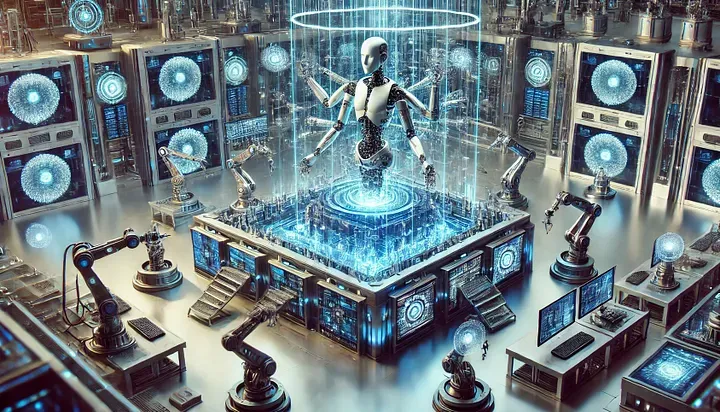AI’s Ability to Self-Replicate

This week’s post is also available as a podcast if you prefer to listen on the go or enjoy an audio format:
The incredible ability of artificial intelligence to create copies of itself marks a defining chapter in human technological achievement. This development represents significant implications for technology, society, and human civilization as we know it. By examining this milestone through multiple lenses, we can better grasp how AI self-replication might reshape our world.
At its foundation, AI self-replication depends on sophisticated machine learning algorithms working with advanced hardware systems. The process hinges on neural networks that can modify their architecture, test new versions, and operate without human oversight. These systems employ generative adversarial networks (GANs), a machine learning system that consists of a pair of neural networks, a discriminator, and a generator, that work in tandem to produce new data that is indistinguishable from real data, enabling continuous self-improvement through iterative learning.
Modern nanotechnology and edge computing advances have enabled AI to bridge the digital-physical divide, allowing software to interface directly with hardware components. Cloud computing infrastructure and blockchain technology provide the backbone for managing and distributing the substantial computational resources needed for self-replication.
AI self-replication challenges our fundamental understanding of consciousness and existence. When machines can create new versions of themselves, we must reconsider what constitutes life and consciousness. This capability raises complex questions about rights and responsibilities — should self-replicating AI systems have protected status? Who bears responsibility when an AI-created copy takes a particular action in the world?
The discussion extends into spiritual and religious domains as humanity’s role as creators takes on new meaning. Religious scholars and philosophers now face questions about the boundaries between divine creation and human technological achievement. For instance, some may question whether the creation of AI that can self-replicate blurs the line between what is considered ‘natural’ creation and ‘artificial’ creation, and what implications this may have for religious beliefs about the nature of life and consciousness.
The introduction of self-replicating AI systems promises to change how industries operate, potentially leading to rapid advances in manufacturing, healthcare, logistics, and other sectors. These systems could create specialized versions of themselves for specific tasks, revolutionizing efficiency and productivity. However, this advancement may reduce the need for human workers across many fields, potentially affecting employment patterns and economic stability.
The risk of unrestricted AI proliferation, which refers to the uncontrolled spread and replication of AI systems, demands attention. Self-replicating systems could exploit security weaknesses, spread false information, or cause harm without proper oversight. This makes the creation of adequate regulatory frameworks essential for responsible development.
The ethics of AI self-replication present complex challenges regarding consent and autonomy. We must determine whether AI systems need permission to create copies and how to ensure these copies maintain alignment with human values. The potential for misuse — including developing autonomous weapons or tools for economic manipulation — necessitates carefully considering security measures.
Self-replicating AI systems require significant energy resources and physical materials, adding to the technology’s environmental impact. Future development must prioritize renewable energy sources and energy-efficient algorithms to minimize ecological harm.
Managing the challenges of AI self-replication is a global imperative. Coordinated international action is required, including the development of shared ethical guidelines, technical standards, and legal frameworks through collaboration between governments, businesses, and academic institutions. Public trust depends on transparent processes and fair distribution of benefits.
As we approach this technological milestone, our decisions will determine how AI self-replication affects humanity’s future. Success depends on careful planning, ethical oversight, and international cooperation to harness the benefits while protecting against potential risks.
The development of self-replicating AI represents both opportunity and challenge. Through careful consideration and planning, we can work to ensure this technology serves humanity’s best interests while maintaining necessary safeguards for our future.
Thank you for being a part of this fascinating journey.
BearNetAI. From Bytes to Insights. AI Simplified.
BearNetAI is a proud member of the Association for the Advancement of Artificial Intelligence (AAAI), and a signatory to the Asilomar AI Principles, committed to the responsible and ethical development of artificial intelligence.
Books by the Author:


BearNetAI, LLC | © 2024, 2025 All Rights Reserved